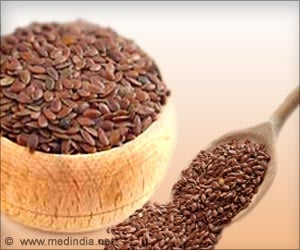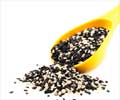Chia vs. Flax: Seeds of Wonder! Dive into their superpowers, sprinkle some magic into your meals, and let the health games begin!
- Chia seeds are rich in fiber, protein, and omega-3 fatty acids, aiding digestion and promoting a feeling of fullness
- Flax seeds stand out for their lignan content, known for potent antioxidant properties, potentially reducing the risk of chronic diseases
- Both seeds offer high fiber, omega-3s, and antioxidants, supporting heart health, digestion, and overall well-being
Nutritional Comparison Between Chia Seeds and Flax Seeds
Chia seeds, derived from the Salvia hispanica plant, boast an impressive nutritional profile. Packed with fiber, protein, omega-3 fatty acids, antioxidants, and an array of vitamins and minerals, these seeds offer a diverse range of nutrients in a compact package (1✔ ✔Trusted SourceChia Seeds ( Salvia hispanica L.): An Overview-Phytochemical Profile, Isolation Methods, and Application
Go to source). One of the remarkable features of chia seeds is their ability to absorb liquid, forming a gel-like consistency that aids digestion and promotes satiety (2✔ ✔Trusted Source
Chia seeds ( Salvia hispanica L.): A therapeutic weapon in metabolic disorders
Go to source).
Did You Know?
Chia seeds were once used by ancient Aztec warriors for sustained energy and endurance during battles!
Nutritional value and functional properties of flaxseed
Go to source). What sets flax seeds apart is their notable lignan content, plant compounds renowned for their potent antioxidant properties. These lignans play a crucial role in reducing the risk of chronic diseases such as heart disease and cancer (4✔ ✔Trusted Source
Potential protective properties of flax lignan secoisolariciresinol diglucoside
Go to source). Additionally, flax seeds are a good source of protein and essential vitamins and minerals, further enhancing their nutritional value.
Health Benefits of Chia Seeds and Flax Seeds
Both chia seeds and flax seeds offer an array of health benefits that support overall well-being. Their high fiber content promotes digestive health by facilitating regular bowel movements and preventing constipation. Moreover, the omega-3 fatty acids present in both seeds contribute to heart health by reducing inflammation, lowering blood pressure, and improving cholesterol levels. Additionally, the antioxidants found in chia and flax seeds combat oxidative stress, protecting cells from damage caused by free radicals and potentially lowering the risk of chronic diseases. Chia seeds, being naturally gluten-free, are suitable for individuals with gluten sensitivity or celiac disease. Furthermore, the combination of fiber, protein, and water-absorbing properties may aid in weight management by promoting a feeling of fullness.Incorporating Seeds Into the Diet
Adding chia seeds and flax seeds to your diet is simple and versatile. Chia seeds have a neutral flavor and can be seamlessly incorporated into various dishes, including smoothies, yogurt, oatmeal, salads, and baked goods. Their ability to absorb liquid makes them ideal for creating chia pudding, a nutritious breakfast or dessert option.Flax seeds, with their slightly nutty flavor, are often ground before consumption to enhance digestibility and nutrient absorption. Ground flax seeds can be sprinkled over cereals, mixed into pancake or muffin batter, or added to soups and stews for an extra nutritional boost. Whole flax seeds can serve as a crunchy topping for salads or be included in homemade granola.
Chia Seeds Vs. Flax Seeds: What to Eat?
In the chia seeds vs. flax seeds debate, both emerge as nutritional powerhouses, offering a plethora of health benefits and culinary possibilities. Ultimately, the choice between the two depends on personal preference, dietary requirements, and culinary inclinations. Whether you prefer the gel-like consistency of chia seeds or the nutty flavor of flax seeds, incorporating these nutrient-packed seeds into your diet can be a simple yet effective way to support overall health and well-being. So, why not sprinkle a handful of these tiny seeds onto your next meal and reap the many benefits they have to offer?While flax seeds are high in fiber, both soluble and insoluble, which can promote regularity and digestive health, consuming large amounts without adequate water intake may lead to digestive discomfort. Some individuals may also be allergic to flax seeds, experiencing symptoms such as itching, hives, swelling, or difficulty breathing. If you have known allergies to other seeds or nuts, you may be at a higher risk of allergic reactions to flax seeds.
References:
- Chia Seeds ( Salvia hispanica L.): An Overview-Phytochemical Profile, Isolation Methods, and Application - (https://pubmed.ncbi.nlm.nih.gov/31861466/)
- Chia seeds ( Salvia hispanica L.): A therapeutic weapon in metabolic disorders - (https://pubmed.ncbi.nlm.nih.gov/36655089/)
- Nutritional value and functional properties of flaxseed - (https://pubmed.ncbi.nlm.nih.gov/22888664/)
- Potential protective properties of flax lignan secoisolariciresinol diglucoside - (https://www.ncbi.nlm.nih.gov/pmc/articles/PMC4517353/)
Source-Medindia












